Ex-Iranian President Ahmadinejad's Guatemala Travel Plans Thwarted
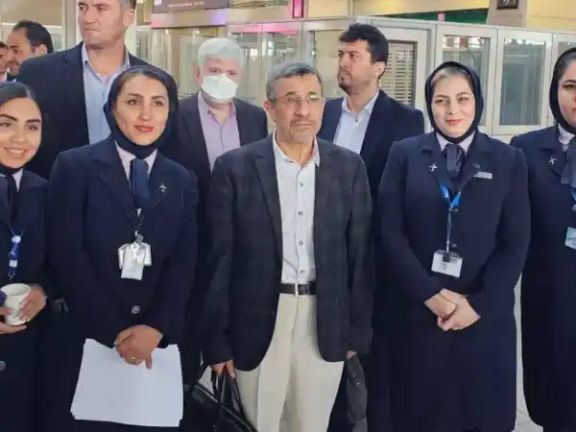
Security authorities at Imam Khomeini Airport in Iran thwarted former President Mahmoud Ahmadinejad's trip to Guatemala, seizing his passport and giving him a travel ban.

Security authorities at Imam Khomeini Airport in Iran thwarted former President Mahmoud Ahmadinejad's trip to Guatemala, seizing his passport and giving him a travel ban.
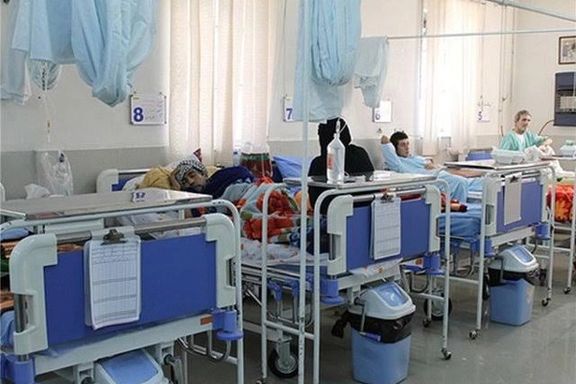
There has been a spike in patients fleeing healthcare facilities in Iran due to the high cost of medical treatment, with some hospitals resorting to imprisoning patients.
In a report published by the Ham-Mihan newspaper on Thursday, a head nurse at a government hospital in Tehran disclosed that, on average, two to three patients per week flee without settling their medical bills. Such occurrences frequently involve patients from the emergency department, including injured construction workers and working class Iranians.
It is not only Iranians mixed up in the scandal, with several patients lacking medical coverage, migrants who lack insurance coverage, unable to pay the higher fees for those not covered. Rising costs of living, shortages of medication, expensive laboratory tests, and hospitalization fees are all compounding the problem.
Some families are even unable to claim dead bodies due to high hospital bills. One such case involved a young Afghan laborer who underwent heart surgery at a Tehran government hospital but did not survive. The hospital issued a $2,000 bill for his friends, who were unable to pay, leading them to abandon his body at the hospital.
In such cases, bodies typically remain in the morgue for several days, and if relatives do not claim them, they are buried anonymously, labeled as "unidentified."
In another section of the report, Mohammad Sharifi Moghadam, the Secretary-General of the Nursing House, mentioned that a large hospital in Tehran has established separate rooms for impoverished patients and keeps them in custody until their medical expenses are settled.
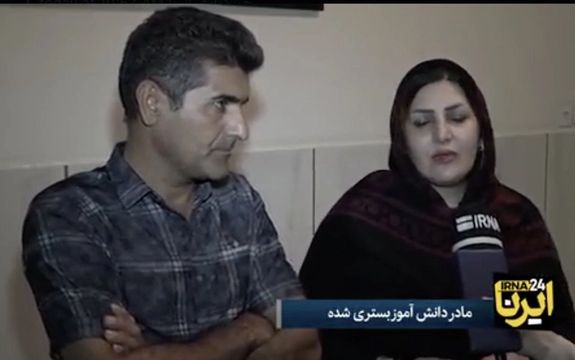
The mother of the teenage girl left comatose after an altercation with morality police on the Tehran subway, has been arrested by Iranian security forces.
The news that 16-year-old Armita Geravand's mother Shahin Ahamadi, was arrested, was revealed on X on Thursday by the Iranian-Kurdish rights group Hengaw. Iranian state media has denied the arrest.
Geravand, who is currently in critical condition, was reportedly involved in a confrontation with authorities in the Tehran metro due to an alleged violation of Iran's hijab law. Geravand lost consciousness when her head struck a pole inside a subway car.
Despite claims by the regime that the teenager's family has viewed video footage from inside the train, her mother denies the claims. It is estimated that over five minutes of footage, including content recorded before Geravand lost consciousness, have been censored by the regime.
Fajr Hospital, where the teen remains in intensive care, is under tight surveillance, with security forces deployed around the facility.
Geravand's classmates are reportedly facing threats from regime security, discouraging them from releasing any photos or information related to the incident.
The Iranian regime has stationed hijab police at all subway stations in Tehran as part of an intensified hijab enforcement campaign as the Women, Life, Freedom movement continues to resist the mandatory hijab.

More than 40 member states of the UN Human Rights Council have expressed "serious concern" over the approval of Iran's new hijab bill it branded "gender apartheid".
The law imposes harsher penalties, including longer prison sentences and higher fines, on women who do not adhere to the country's strict Islamic dress code for head coverings and modest attire. Late in September, Iran’s Parliament announced that the bill was approved for a "three-year trial run" following coordination by the judiciary.
During a Wednesday meeting at the 54th Session of the Human Rights Council (UNHRC), the majority of the 47-member group endorsed a statement, initiated by Canada, condemning the Islamic Republic’s intensified measures to enforce hijab through the new bill. The statement was delivered by Canada’s Ambassador to the Council, Leslie E. Norton.
“We join our voices to those of the High Commissioner, Special Procedures, and the Fact-Finding Mission on Iran to express serious concern at the recent adoption of the Chastity and Hijab bill by the Iranian Parliament,” read the statement.
The contentious bill's content was finalized by a committee of approximately 10 lawmakers making the best use of an obscure regulation known as Article 85 of the constitution that enabled the parliament to effectively sideline opposition by restricting discussions on the bill to an internal committee. The only aspect voted upon was the duration for the trial implementation.
Raising alarm over Iran’s plans to deepen punishments for women and girls who do not obey its “draconian compulsory dress code,” the member countries decried the regime for seeking “to force non-complying women into an unprecedented social and economic siege", measures including travel bans, denial of education, health facilities and other public services. Private businesses will also be compelled to refuse services to uncovered women.
UN rights experts branded the new law as “gender apartheid" in September. Rights group Amnesty International said it will impose “draconian penalties” and called on the international community to pressure Iran to revoke the 'despicable' bill.
The signatories also voiced worries about the ever more invasive use of artificial intelligence and facial recognition technology to crack down on women who defy hijab. They say the recently introduced measures worsen the already dire situation for women and girls, “marked by widespread and systematic discrimination in law and practice, in many aspects of their public and private life.”
Referring to the nationwide movement that rallied behind the slogan “Women, Life, Freedom,” the group urged Iranian authorities to heed to the legitimate claims of protesters, and to abide by its obligations under international law, including in matters of women’s rights and gender equality.
“Women and girls of Iran should not be treated as second class citizens and must enjoy the full array of their human rights, free from discrimination, surveillance and fear of retribution,” added the statement.
The move came as an Iranian teenager, Armita Geravand, is in coma following a violent encounter with hijab enforcers at Tehran’s subway. Authorities are handling the situation exactly as they did in the case of Mahsa Amini, with blackouts on CCTV footage, arresting her mother and the journalist who tried to cover the case. Routine denials continue from the highest levels of the regime and massive security is in place around the hospital in which she is in intensive care.
The UNHRC courted global controversy earlier this year when it invited Ali Bahreini, Ambassador of the Islamic Republic of Iran and Permanent Representative to the United Nations, to chair the 2023 UNHRC Social Forum next month. The move gained widespread criticism. The European Parliament said the appointment "is nothing more than a slap in the face given the human rights situation of most Iranians, particularly women, and the repeated executions in the wake of the ongoing protests in the country", in addition to its appalling handling of the pandemic in which it refused to accept Western vaccines at the cost of hundreds of thousands of lives.
The United Nations also came under fire last month for allowing President Ebrahim Raisi to take the stage at the annual General Assembly, giving voice to the regime narrative in which he claimed Iranian women's rights are "unparalleled".
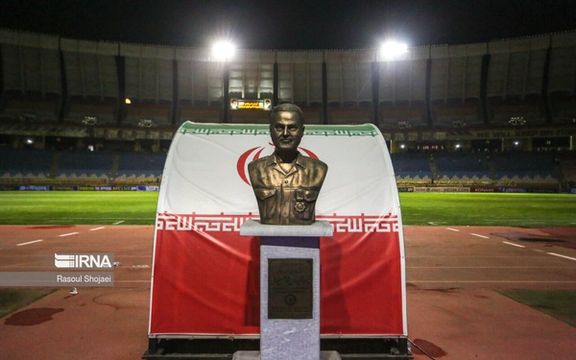
Regardless of what many might say about IRGC’s Qassem Soleimani and his role as a terror mastermind, even after his death he continues to disrupt good neighborliness.
The Iranian regime has displayed his banners, posters and dozens of statues and busts all around the country to honor its "hero", which brings home the sense of how far the regime is from understanding the prevailing mood in Iran and in the region.
The statues and busts made of him are far from descent and are often mocked by not only art critics, not only from art critics but also from the public. Notably, the controversial bust located at the Naghsh-e Jahan stadium in Esfahan garnered attention when it irked members of the Saudi al-Ittihad football team to the extent that they returned to Riyadh before their scheduled AFC championship match against Iran's Sepahan team.

This sculpture, like all others, failed to convey grandeur or military might and fell short of capturing the essence of an internationally recognized figure, even if that figure happened to be a notorious terrorist despised by many regional countries threatened by him before he was killed by a US drone strike in 2020. In short, it was far from being a piece of art.
The individuals who commissioned these sculptures are the same hardliners who orchestrated the torching of the Saudi Embassy in Tehran and its consulate in Mashhad in January 2016. Whether placing Soleimani’s bust in a football stadium right before a match with a Saudi team was a mere coincidence or a deliberate attempt, the outcome is nothing short of a blatant sabotage effort aimed at undermining the newly restored Tehran-Riyadh relations.

The presence of the bust posed a security and public diplomacy challenge that may or may have not been meant to unfold before the eyes of millions of viewers waiting for the match on satellite televisions or online.
Even without the challenge, the slogans shouted by male spectators protesting the ban Iranian women from going to stadiums to watch football was embarrassing enough. Political commentator Abbas Abdi in Tehran likened the decision to prohibit women from entering stadiums to a Catch-22 situation, one that the Islamic Republic is unable to tolerate yet also cannot disregard under pressure from the international athletic community.
Social media users posted a video depicting a senior policeman telling women that only a limited handpicked group of female spectators would be allowed into the stadium.
As the Saudi team departed Iran without playing in Esfahan, Iran's hardliner media and politicians resorted to conspiracy theories to justify what had gone wrong. Some claimed that Ittihad did not want to face Sepahan, but this explanation failed to address why the bust was placed at the stadium, especially when the Saudis had previously protested the presence of Soleimani's photos at a news conference venue in the Iranian foreign ministry.
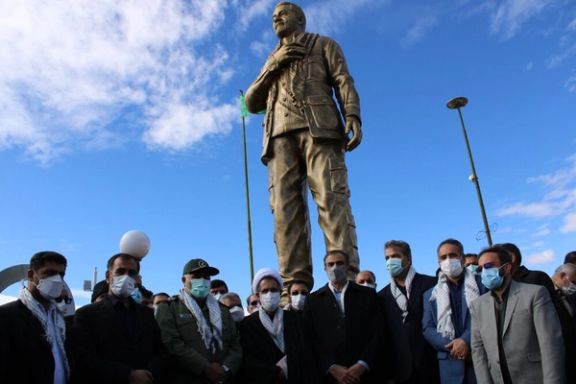
Was this another attempt by hardliners opposing the rapprochement with Saudi Arabia? While no one can say for certain, it is a plausible scenario, particularly given that some politicians have sought to undermine progress in Tehran-Riyadh relations, which some argue Iran only accepted under immense pressure from China and its regional interests.
Furthermore, Iran's hardliners are likely to attempt to sabotage the newly restored ties at every opportunity. Even Iran's Supreme Leader, Ali Khamenei, did not miss the chance during Unity Week, a period commemorating unity among various Muslim sects, to criticize Saudi Arabia for its efforts to improve relations with Israel.
Iran's Foreign Minister, Hossein Amir Abdollahian, claimed to have spoken with his Saudi counterpart over the phone to address the issue, but he did not disclose the results of these discussions.
The chants of tens of thousands of spectators quickly shifted from demanding the removal of the bust to calls for regime change and ominous cries of 'Death to the dictator.'
In the words of an Iranian proverb, “Now bring your donkey and load the spilled beans,” or as another Persian saying goes: “An insane man throws a stone into a water well that a hundred wise men cannot retrieve."
The opinions expressed by the author are not necessarily the views of Iran International
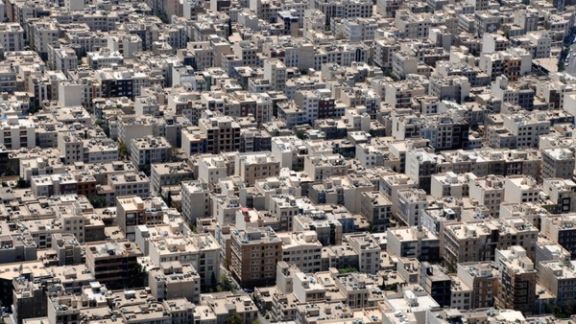
Rents in Iran have surged by 60% over the past year, with 12 provinces experiencing increases exceeding 70%.
The figures were released by the Eco Iran website, citing statistics from the government-run Statistical Center of Iran for the Iranian year up until March 2023.
In the previous year, 20 provinces, equivalent to 64.5% of Iran's provinces, witnessed rent growth rates surpassing the national average. The report also highlighted that rent inflation in Tehran province exceeded 52%, resulting in the average monthly household rental cost in Tehran province rising from $105 in 2021 to $160.
Additionally, data from the Statistical Center of Iran indicates that the average expenses for housing, water, sewage, fuel, and electricity surged by nearly 60% during the same period.
For around one year, both the Statistical Center and the Central Bank have ceased publishing regular reports on developments in the housing market, drawing criticism from economic experts and the construction and real estate sectors.
Recently, officials from the Ministry of Roads and Urban Development have prioritized restricting property buying, selling, and renting platforms with real estate consultants and property transaction platforms having been accused of contributing to price hikes.
The situation coincides with a report from the Donya-e-Eqtesad newspaper, indicating that the nationwide growth in rent prices from March to September 2023 has reached its highest level in 12 years, surging to 38.5%.
Reports from mid-2022 previously highlighted a staggering increase of over 300% in Tehran's rental prices within a three-year timeframe. Additionally, statistics released in December 2021, around six months after Ebrahim Raisi assumed the presidency, revealed that food and housing costs had surged by 300% to 740% over the preceding six years.
Stopped by IRGC intelligence officers, Ahmadinejad was traveling to a scientific and research symposium on water resource management, as a guest of the government and the University of Guatemala.
There has long been talk of a travel ban on Ahmadinejad, however, even before the latest designation. Back in 2021, rumors began of the ban being lifted when he took a trip to Dubai, visiting the Dubai Expo. The trip was cut short by Tehran after the former president began making statements claiming to be the voice of the Iranian people, a press conference in the UAE's party capital being canceled for fear of his gaining political capital and Ahmadinejad swiftly brought back to Iran.
However, the rumors may now be true, the former president designated by the US Department of the Treasury last month, facing allegations concerning the fate of Robert Levinson, a US national who vanished in 2006 after flying from Dubai to Iran's Kish Island. Despite no conclusive information regarding his whereabouts, the US government believes he may have died while in Iranian custody.
Ahmadinejad served as the President of Iran from 2005 to 2013. The DOT claims "During Ahmadinejad’s term in office, MOIS [Ministry of Intelligence and Security] was involved in the detention of several US nationals, including former Federal Bureau of Investigations (FBI) special agent Robert “Bob” Levinson, as well as three US hikers: Shane Bauer, Joshua Fattal, and Sarah Shourd."
However, media outlets tied to the Islamic Republic have reported that it is "Guatemala's fragile political climate" and "security concerns" which led to the stoppage, Ahmadinejad a member of the Expediency Council and an official political figure. "He has been strongly advised against undertaking the journey, taking into account international sanctions and the risk of detention," claimed.